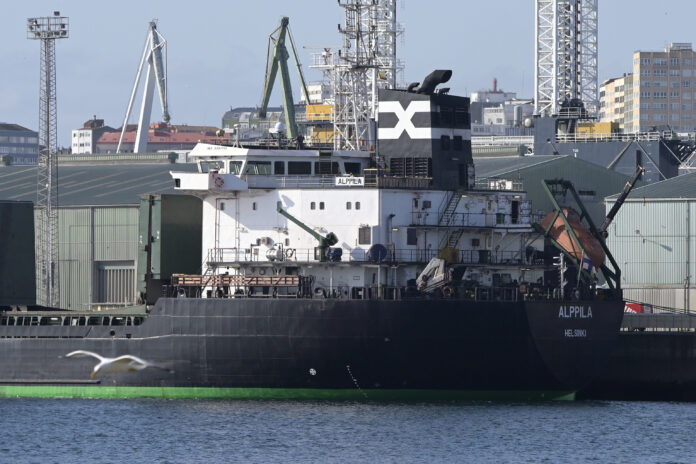The first large shipment of corn from Ukraine since the Black Sea ports were blocked by the Russian navy when the war began -109 days- has arrived in Spain. Specifically, it docked on Monday in the port of La Coruña aboard the ship Alppilia, where 18,000 tons have been transported in what has meant the first shipment of cereal that will alleviate the lack of feed, in general, of Spanish farmers, and , specifically, from Galician feed manufacturers, who will be the first to receive this raw material. The unloading of the cereal in the main cereal port of the Cantabrian coast was carried out throughout the day on Monday.
Transport has not been exempt from difficulties to avoid the Russian blockade, so a new maritime route opened through the Baltic Sea has been opened for the occasion. Previously, the shipment was transported – in small quantities – by road in trucks from the borders of western Ukraine with Romania and Poland, destined for the port of Swinoujscie, in this second country, in Western Pomerania, where it was loaded in the warehouses of the freighter bound for Galicia. Thus, it arrived at the San Diego dock around 06:00 (two days late according to forecast estimates), although before that it made a stopover at the German port of Brunsbüttel. It is expected that this will be the new route that Ukrainian shipments will use for the coming months and that the approximately 20 million tons that are held in Ukraine will be unblocked.
It must be remembered that corn is one of the raw materials that has suffered the most from the blockade of shipments from the so-called ‘breadbasin of Europe’ after the war broke out in Ukraine in February, which is why the Spanish livestock sector has had significant problems of shortages and, above all, higher prices.
On Sunday another shipment of corn -with 40,000 tons- arrived, in this case from Brazil, also to the port of La Coruña, at Punta Langosteira. This situation has occurred since the EU has relaxed the phytosanitary standards for imports from the United States and Latin America.
These changes in the route of the Ukrainian agricultural market come after the request of the Mediterranean countries to unblock the situation of the Ukrainian cereal that has been blocked by the Russian fleet in the Black Sea. The Ministers of Agriculture showed last Wednesday at the First Ministerial Meeting on the Food Crisis their concern about a possible food shortage -especially in North Africa- due to this blockade situation.
Even at the end of last May, the president of the European Commission, Ursula von der Leyen, accused Vladimir Putin of bombing grain stores. Last week, Russia said it was willing to allow a naval corridor from Ukrainian territory to get the blocked grain out, according to its Russian Foreign Minister Sergei Lavrov.
The director of the Galician Association of Manufacturers of Compound Foods (Agafac), Bruno Beade, has assessed the shipment from Ukraine as “good news because it is good that they are beginning to take out some quantities”, but has warned that “although they seem like many tons In reality, there are few considering the great demand that our sector has”.
Cereal accounts for a third of the grains used to make feed for animals. Galicia imports 40% to Ukraine and the invasion of the country paralyzed trade. Since the beginning of the conflict, a ton of corn has already become more expensive by more than 100 euros and is now paid at a price close to 400, a record amount. Spain imports approximately 30% of the corn it needs from the Ukraine each year. In addition to corn, 60% of Spanish purchases of sunflower oil abroad also come from Ukraine, as well as 17% of wheat and 31% of vegetable oil cakes, according to data provided by Asaja.
In addition, this agrarian organization warns that Spain needs more than 36 million tons of cereals annually to meet its consumption needs (human and animal). However, the campaign advance data show that this year’s winter grain harvest will suffer a reduction of 21%; that is, 4.1 million tons less compared to the official data for last year. The high temperatures and the absence of rain during the month of May put an end to harvest expectations that were considered very good. This is especially worrying for a country like Spain, which has a grain deficit, if we also take into account the repercussions of the invasion in Ukraine.
Conforms to The Trust Project criteria








